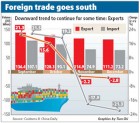On 20 January we watched the changing of the guard in Washington – on CNN. First I thought I’d miss it, being stuck in the BTV studios for a TV recording but we came home, wanted to have a short look, did not plan to watch it al. We ended up going to bed near 2am as the events were so lively to watch (for once CNN did OK). Many of our friends (not all American) here did the same – got hooked and looked till very late. The enthusiasm of the crowds was unique.
We are all looking forward to the future though it will be tough. Enthusiasm in DC explodes into excess consumerism – part of the economic stimulus plan? They even sell toilet paper (toxic ink, so don’t use it!), sex toys (anybody can explain?), hot sauce, all à la Obama. Most probably financed by China savings. Here we sure could use some of that creativity.
Let’s also wait and see how quickly Obama peddles back (as all U.S. presidents) on his rhetoric blaming China (currency speculation, etc.). China liked “Xiao Bu” (“Small Bush”) as he was a “trustworthy friend of China”. Chinese leaders feel a bit nervous with Obama as they don’t know him so well.
Time for closure anyway. SCMP came out the same day with this article – much in line with all media in Asia – including Mainland China.
20 January 2009 – “Bush leaves America divided and in a rut”
South China Morning Post
George W. Bush became the 43rd president of the United States in the shadow of a divisive election. He lost the popular vote but won after a controversial Supreme Court ruling on a disputed result in the state of Florida. He entered the White House promising to heal division by being a “uniter, not a divider”. He leaves it today as one of the most divisive and least popular presidents in US history.
Mr. Bush presided over a decline in America’s reputation and moral leadership. He led the nation into a disastrous war in Iraq, polarised it socially with a hardline stance on moral issues, and weakened it financially with tax cuts for the rich and extravagant spending. He leaves it in a deep recession arising from a financial crisis that resulted from lax supervision of investment banks. How did this happen to a man who campaigned for the nation’s highest office eight years ago as a “compassionate conservative”?
The answer lies in the terrorist attacks of September 2001. They would have tested any occupant of the White House. Thrown off balance, Mr. Bush came to rely heavily on an inner group of advisers, led by powerful vice-president Dick Cheney. They pushed him to the right with partisan politics, contempt for democratic checks and balances and disregard for the concerns of America’s allies.
By the time he campaigned for re-election in 2004, he had ditched the conventional political wisdom that he must appeal to the moderate middle ground, instead exploiting fears about national security and deep rifts on gay rights, abortion and stem-cell research.
The decision to invade Afghanistan in pursuit of al-Qaeda won international support and was popular at home. Not so the invasion of Iraq – without United Nations backing and on trumped-up evidence that it had acquired weapons of mass destruction – and the excesses of the ill-conceived “war on terror”. They left a litany of stains – among them the mistreatment of terror suspects and electronic spying on Americans without warrants – on values that have made America a beacon of human rights and the rule of law.
Mr. Bush showed little appetite for the details behind the big picture. People who meet him say he lacks curiosity. That was a trait that frustrated former British prime minister Tony Blair in the lead-up to the invasion of Iraq, as he tried in vain to establish that Washington had a coherent plan for occupation and reconstruction.
There are also positives to take into account, such as his defence of free trade, efforts to raise school standards, resistance to political pressure to retaliate against China for holding the value of its currency down and a US$15 billion anti-Aids programme in Africa. As Mr. Bush points out, history will not judge him until long after he is gone. Sadly, his main legacy is an America whose reputation his successor needs to restore and whose people he must strive to unite.



